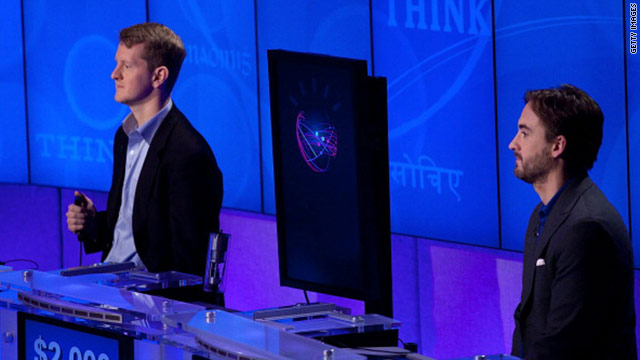Computer spanks humans on Day 2 of 'Jeopardy!'

- IBM's Watson computer finishes second "Jeopardy!" show way ahead of its human challengers
- Despite blowing Final Jeopardy! question, Watson earns $25,000 more than the runner-up
- The human-computer match ends on "Jeopardy!" Wednesday night
(CNN) -- So far, it's elementary for Watson.
Despite blowing a Final Jeopardy! question about airports, IBM's computer dismantled its human rivals during Tuesday night's special edition of the "Jeopardy!" game show.
Watson finished the first game of a two-game match with $35,734 in winnings, far ahead of runner-up Brad Rutter, who earned $10,400. Ken Jennings trailed with $4,800.
Watson, represented on the set by a black, tablet-like avatar, got 13 questions right before one of his flesh-and-blood challengers (Jennings) answered correctly. The computer nailed answers on an impressive variety of topics, ranging from architecture to biological science to classical music to "Saturday Night Live."
However, Watson bungled the night's final question, about what city has its largest airport named for a World War II hero and a second airport named for a World War II battle.
It guessed, "Toronto????." Jennings and Rutter, each a top "Jeopardy!" champ, both got the correct answer: Chicago.
 'Jeopardy!' contestant versus computer
'Jeopardy!' contestant versus computer
 Man vs. machine on 'Jeopardy!'
Man vs. machine on 'Jeopardy!'
 'Watson' debuts on Conan
'Watson' debuts on Conan
Still, it was a dominant performance by IBM's massive machine, which has been in development for years and has the processing power of 2,800 "powerful computers." Watson chirped answer after answer correctly, leaving Jennings and Rutter to stand by mutely.
Even when Watson wasn't sure of an answer, as on a question about King Philip of Spain, its closest guess -- as revealed on the TV screen -- was still correct.
The game was spread over two days. Tuesday's rounds were much less competitive than in Monday's opener, which ended with Watson tied with Rutter and $3,000 ahead of Jennings. The third and final Watson episode airs Wednesday night.
IBM trumpets Watson as a major advancement in machines' efforts to understand human language. The computer receives clues through digital texts and then buzzes in against the two other "Jeopardy!" contestants like any other player would.
The winner of the three-day competition wins $1 million, second place takes home $300,000 and third place nets $200,000. IBM says it will donate Watson's winnings to charity.
Watson's performance drew a lot of chatter online.
"I think the only thing this challenge proves is that the computer is faster at ringing in than Brad or Ken, not smarter," posted Tate Hinkle on "Jeopardy's" Facebook fan page.
"Great, you have a multimillion dollar supercomputer that is really good at trivia, now what?" said one CNN.com commenter, dtboco3.
Another commenter, josh101, replied, "The idea of an interface with a computer system that is capable of interpreting human language is something that a lot of people think will be quite remarkable and pave the way for more interactive robots in health care, help desks, defense, and maybe even education."
CNN's John D. Sutter contributed to this story.
